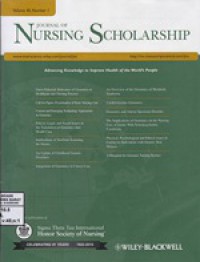
Jurnal
The Implications of Genomics on the Nursing Care of Adults With Neuropsychiatric Conditions
Purpose: Neuropsychiatric disorders contribute substantially to disease burden and quality of life across the lifespan and the globe. The purpose of this article is to review the state of the science regarding genomic contributions to selected common neuropsychiatric conditions and to examine the consequent immediate and future implications for nursing practice and research. Organizing Construct: Our work is guided by an ecological model that recognizes that common diseases are complex or multifactorial, meaning that multiple genomic and environmental factors contribute to their etiology. Methods: A review of the literature was conducted to determine the state of the science in relationship to the genomic contributions to selected neuropsychiatric disorders. Findings: Neuropsychiatric conditions are genomically heterogeneous, both within a single disorder and across groups of disorders. While recent genomic research yields clinically validated and useful information for a small subset of persons (e.g., predictive genetic testing for Huntington disease and early-onset Alzheimer disease), broad clinical application of genetic information is not yet available. In addition, the implications of genomics for the development and targeting of nonpharmacologic treatment strategies is largely unexplored. Conclusions: Further research is needed to expand knowledge beyond genomic risk for the presence of disease to knowledge about the genomic risk for symptoms, symptom burden, and tailored symptom management interventions. Clinical Relevance: Knowledge about the genomic influences on neuropsychiatric conditions suggests important implications for practicing nurses in the identification of persons at risk, provision of follow-up support, and in the administration of medications.
Availability
No copy data
Detail Information
- Series Title
-
Journal of Nursing Scholarship, Volume 45, Number 1 2013
- Call Number
-
(05) 610.5 WIL j
- Publisher
- Malden : Wiley-Blackwell., 2013
- Collation
-
Hlm. 79-88
- Language
-
English
- ISBN/ISSN
-
1527-6546
- Classification
-
(05) 610.5 WIL j
- Content Type
-
-
- Media Type
-
-
- Carrier Type
-
-
- Edition
-
Volume 45, Number 1
- Subject(s)
- Specific Detail Info
-
-
- Statement of Responsibility
-
-
Other version/related
No other version available
File Attachment
Comments
You must be logged in to post a comment
 Computer Science, Information & General Works
Computer Science, Information & General Works  Philosophy & Psychology
Philosophy & Psychology  Religion
Religion  Social Sciences
Social Sciences  Language
Language  Pure Science
Pure Science  Applied Sciences
Applied Sciences  Art & Recreation
Art & Recreation  Literature
Literature  History & Geography
History & Geography